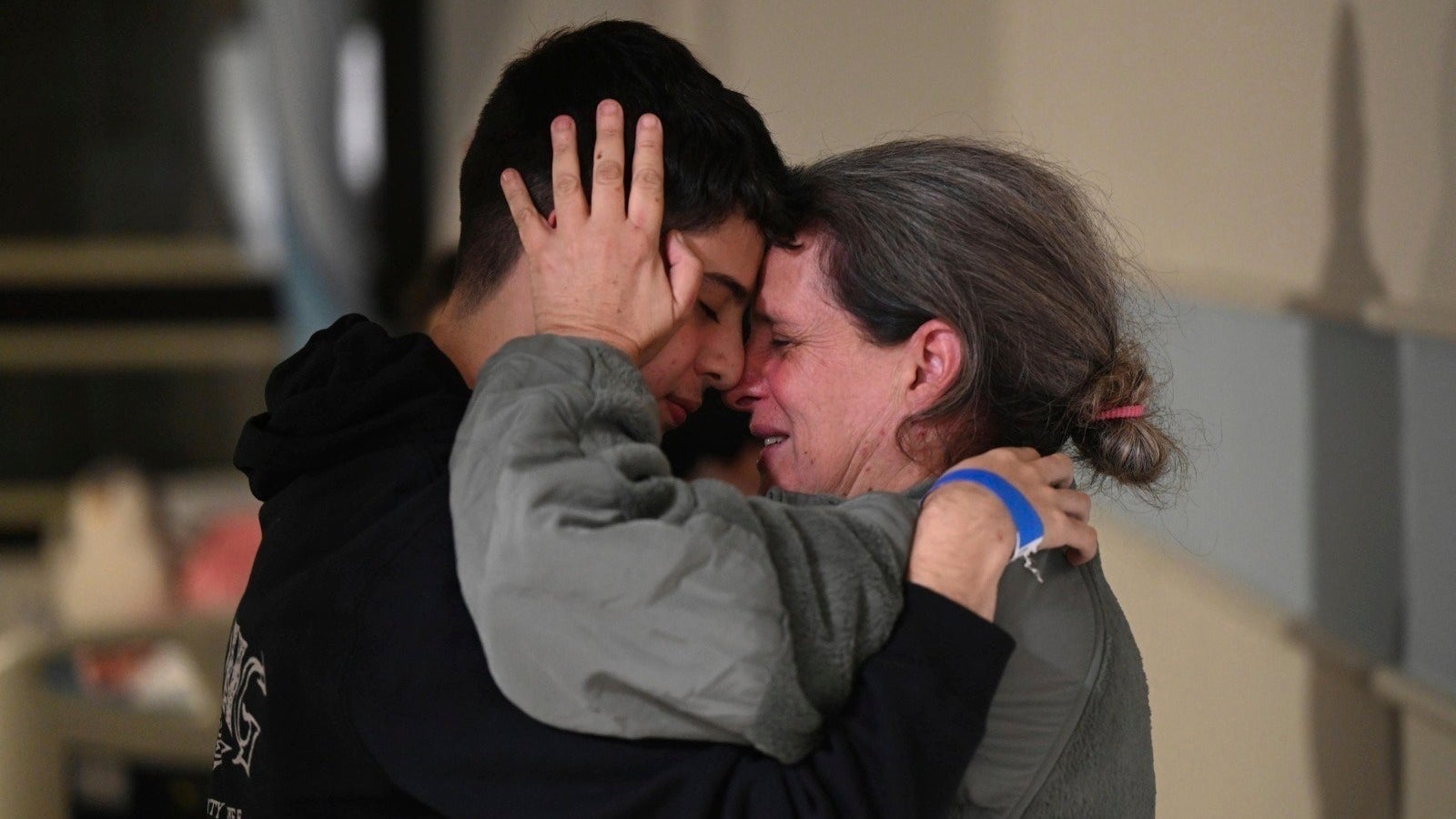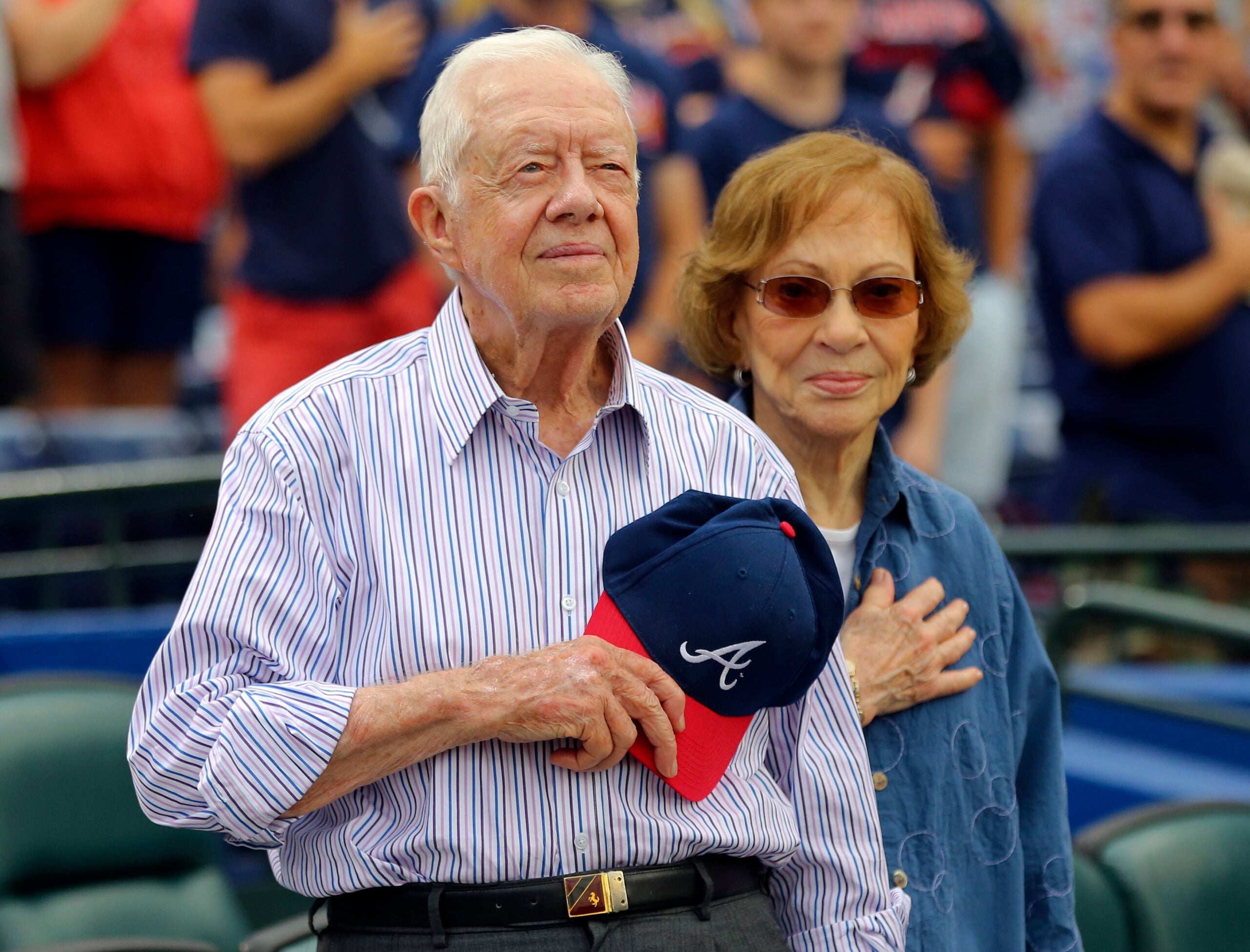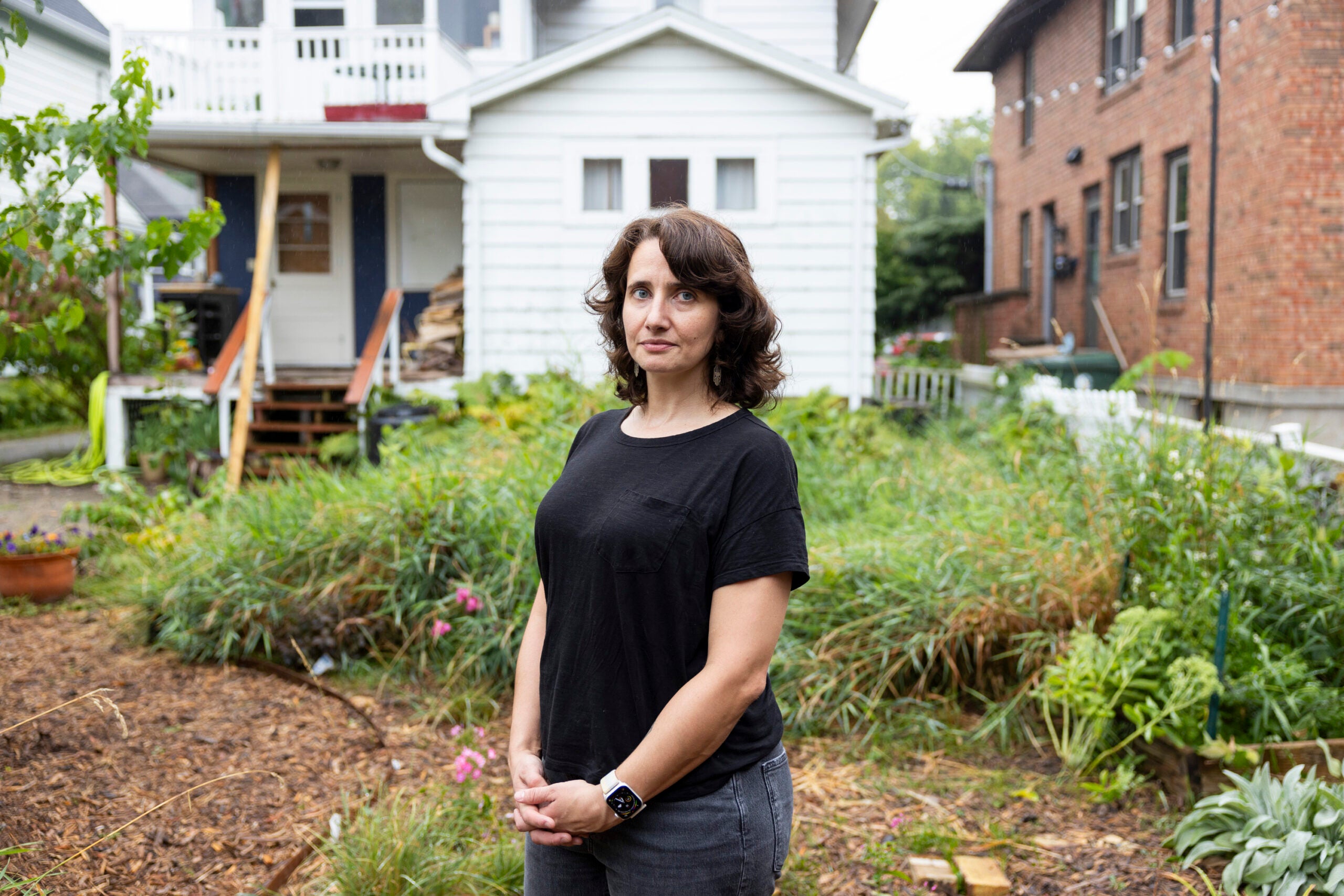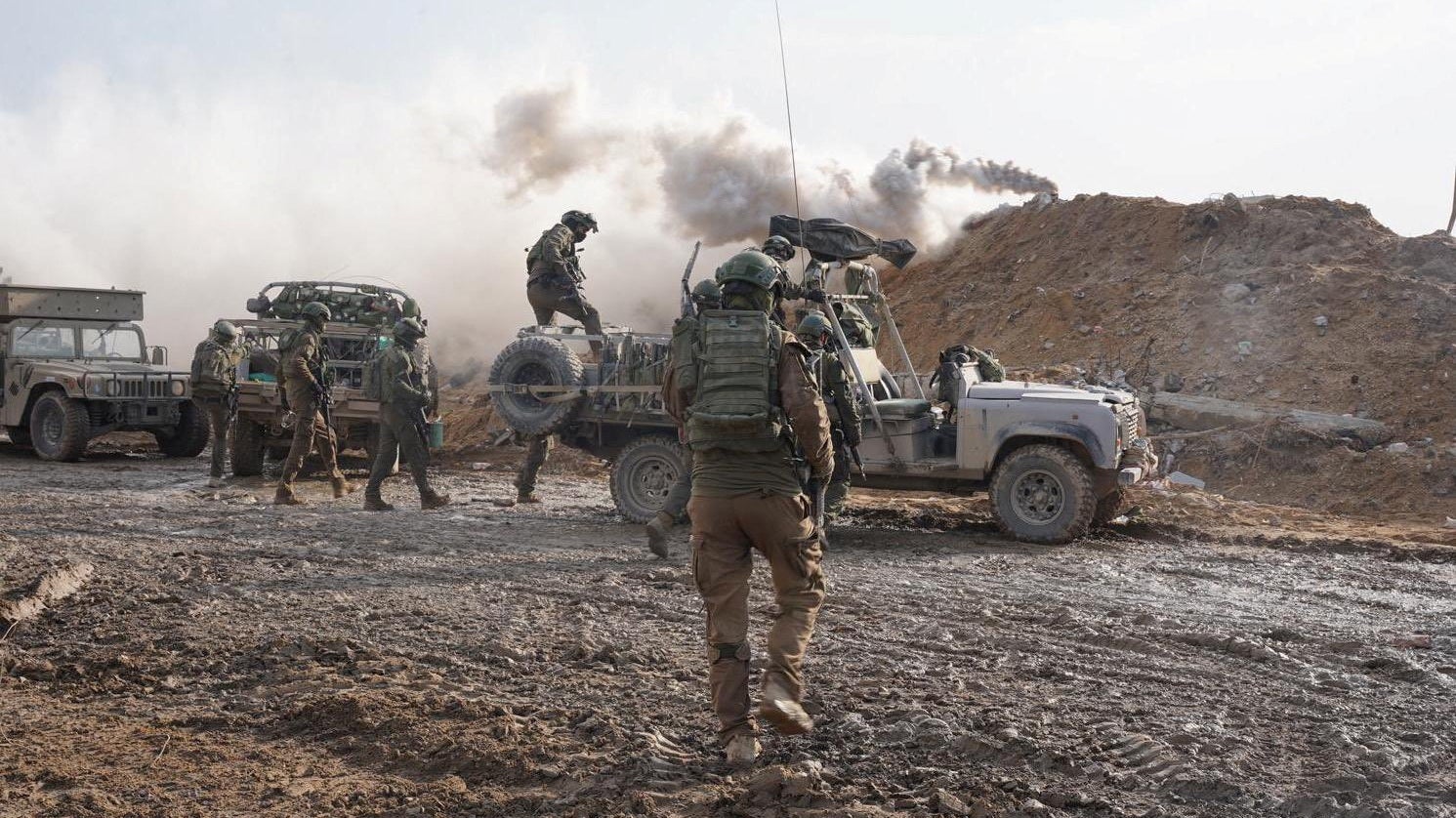On Oct. 7, the Aloni family crowded inside their home’s safe room as Hamas fighters rampaged through their kibbutz in southern Israel, barely two miles from Gaza.
There were two grown sisters, Danielle Aloni and Sharon Aloni Cunio, along with Sharon’s husband and the sisters’ three young daughters.
The situation was dire. Inside, the house was burning and filling with smoke. Outside, they could hear gunshots, one sister later recounted to their brother, Moran Aloni, who was not kidnapped.
News with a little more humanity
WPR’s “Wisconsin Today” newsletter keeps you connected to the state you love without feeling overwhelmed. No paywall. No agenda. No corporate filter.
“She said, ‘I would rather die quickly than to suffocate along with my kids,’” said Moran Aloni, who shared their story at a press conference organized by the Hostages and Missing Families Forum, an organization that was formed after Oct. 7 to advocate for the hostages.
Hamas released more than a hundred hostages during a seven-day ceasefire late last month, including the two Aloni sisters and their daughters, as part of an exchange for the release of Palestinian prisoners and detainees held by Israel. Nearly all the Israelis released were women and minors. Sharon’s husband, David Cunio, remains in captivity.
Families of hostages — and some former hostages themselves — have spoken out publicly in recent days about the harsh conditions of their captivity in an effort to keep attention focused on the more than 100 hostages, among them several Americans, who are still being held by the militant group Hamas.
They hope, too, to increase pressure on the Israeli government to bring those remaining home safely amid an intensive military campaign in Gaza.
“I spent 49 days in that hell. I am asking, begging from all decision makers: Get the kids out, get all of them out,” said 85-year-old Yaffa Adar, who was kidnapped from kibbutz Nir Oz, speaking in a video released by the families group.
Her 38-year-old grandson, Tamir Adar, is among those still in captivity. “I want to see them now, not when I’ll be in a coffin,” she said.
“Agonizing” days in captivity
In total, Hamas fighters and other militants killed about 1,200 people and abducted more than 240 on Oct. 7, Israeli officials say.
The families of Danielle Aloni and Sharon Aloni Cunio were jumbled up as they were taken hostage, their brother said, and one of the 3-year-old twins, Emma, was separated from them altogether. “Someone just snatched Emma from my sister Danielle’s hands,” he said.
For days, as Sharon, David and Emma’s twin Yuli Cunio were held together in a small room, they were sure that Emma had died during the abduction. “These were 10 agonizing days for them,” Moran Aloni said.
One day, Sharon heard a child’s cry coming from another room nearby. “She said to David, ‘I’m hearing Emma crying.’ And David said, ‘You’re imagining things,’ probably thought it was because of the grief,” Moran recounted. “But a mother is never wrong.”
Within minutes, an unknown woman entered the room with Emma in her arms, he said. Reunited, they stayed in the same room for weeks more with about 10 other hostages, fearing daily for their lives. In a meeting this month with Israeli Prime Minister Benjamin Netanyahu, Cunio said they could hear Israeli airstrikes hit nearby, according to reports in Israeli media.
In the small, closed room, one difficulty was managing bodily functions, especially for the small children. “When they needed something, they needed to knock on a door. And maybe someone would come to them after one hour, maybe four hours,” Moran said.
The other sister, Danielle Aloni, was held separately, along with her 6-year-old daughter Emelia. Unlike the Cunios, they were moved around from place to place with different conditions in each location, the family said.
“You sleep and you cry,” Danielle Aloni said in a video released by the families group. “Every day that passes is like a never-ending eternity.”
In one of the rooms where they were held, Danielle and Emelia were ordered to be quiet for days on end. They spoke only in whispers with their fellow hostages.
“Think about the child, with nothing to do, nothing to play, unable to speak up, unable to laugh, unable to cry, unable to shout,” Moran said.
Aloni family members told Israeli TV news outlet N12 that they felt their kidnappers understood the importance of keeping the captives alive.
In total, the Aloni sisters and their families spent about 50 days in captivity.
Physical and mental health is a concern for returned hostages
Medical experts say the released hostages have come home in stable physical health but clearly showing signs of their ordeal.
Returnees had typically lost 10 to 15% of their body weight, out of stress and limited access to food, said Dr. Yael Mozer-Glassberg, a physician at Schneider Children’s Medical Center, a hospital near Tel Aviv that has received dozens of returning hostages.
“I’ve never thought in my entire career I will face that,” Mozer-Glassberg said in the families group press conference. “I pray that I won’t face it once again in my life, because this is so devastating.”
During one patient’s time in captivity, they received a cup of tea and a biscuit in the morning, a serving of rice at dinnertime, and perhaps a dried date, Mozer-Glassberg said. Other families have described similar meals in other accounts in Israeli media.
Water was also limited, both for drinking and for bathing. One family took only three showers while in captivity, and another child was unable to bathe at all, she said.
“You can imagine the medical hygiene that they came back [with],” she said. “I’ve never seen in my life such a terrible, terrible hygiene.”
The poor hygiene led to skin rashes and lice for multiple patients, Mozer-Glassberg added. “You can put your imagination and think of hygiene conditions for 54 days without a shower,” she said.
Other returnees, including Yocheved Lifshitz, an 85-year-old woman who was released in October, have described minimal health care in captivity for abductees, some of whom were injured during the attack on Oct. 7. Shortly after release, Lifshiftz told press that her captors provided food, medicine and a doctor to examine the hostages, but that the experience — which included an abduction by motorcycle during which she was beaten with a wooden pole — was “hell.”
As for the returnees’ mental health, no one can say what recovery will look like. In addition to the time in captivity, the experience on Oct. 7 was a major trauma for the hostages — their kibbutzim rampaged, their homes invaded, neighbors killed and kidnapped.
Concerns about trauma are especially acute for children who were taken hostage, such as Abigail Edan, an American-Israeli who turned 4 years old while in captivity.
“I think that we will only learn as the days go on and for a long time, what really effectively will be the results of having been a hostage and having been in her father’s arms when he was murdered,” said Liz Hirsh Naftali, Edan’s great-aunt, in an interview with NPR.
Noam Avigdori, 12, and her mother Sharon Hertzman, 52, were visiting family in Kibbutz Be’eri on Oct. 7. They were kidnapped from a safe room in their family members’ home and taken together in a van with five other women and children into Gaza.
Her father Hen and 16-year-old brother were not traveling that day and were not kidnapped. Speaking at the families group press conference, Avigdori said the reunion of his family was the happiest moment of his life, even better than the birth of his first child. “The emotion was overwhelming to all of us,” he said.
Noam came home in good physical condition, he said. She laughs still, and she can talk about her time in captivity, he added.
But she sometimes wakes during the night with a scream, and she still won’t let him leave her side, Avigdori said.
“I just ask her, ‘Can I get the trash now?’ And she won’t permit it,” he said.
More than 110 hostages remain in captivity, officials say
The Israeli prime minister’s office has revised the number of hostages thought to remain alive in Gaza. As of Thursday, that estimate stood at 115.
Hamas also holds the remains of about 20 dead, Israeli officials now say, though it is unclear if they died on Oct. 7 or in captivity. Hamas has said that Israeli airstrikes have killed some hostages.
About eight of the remaining hostages are thought to be American, the Biden administration says. On Wednesday, their families met with President Biden and Secretary of State Antony Blinken at the White House.
Most of the remaining hostages are men, Israeli officials say. A small number are women. Some are Israeli soldiers.
Avigdori recently received a phone call from a father whose 24-year-old son is among those still being held, he said. The father’s pain was so moving that Avigdori felt he had to lie, he added.
“And I started to say things [without] necessarily believing in them 100%. But this man was drowning in despair. I have to say something,” Avigdori said. “He saw the picture of me hugging my wife, my boy hugging his sister. I have to give him hope, because hope is all I had for 50 days.”
Negotiations to release more hostages fell apart late last month. Afterward, the temporary ceasefire ended, and the Israeli military has since resumed its offensive. The death toll in Gaza has now reached over 18,700, according to health officials in the Hamas-controlled territory. (The toll does not differentiate between civilians and combatants. Health officials say a majority of the dead are women and children.)
Netanyahu has faced outrage from the families of the missing, who say Israel is not doing enough to bring them home safely. The accounts from the released hostages have only increased that pressure. Netanyahu said last week that Israel will “spare no effort” to return them.
“Any government — the Israeli government, the American government, the Qatari government, any government that is involved right now, or touching the issue of the hostages —is to prioritize bringing all the hostages home alive,” said Gillian Kaye, speaking in an interview with NPR. Her stepson, Sagui Dekel-Chen, 35, remains a hostage.
9(MDAyMjQ1NTA4MDEyMjU5MTk3OTdlZmMzMQ004))
© Copyright 2025 by NPR. To see more, visit https://www.npr.org.9(MDAyMjQ1NTA4MDEyMjU5MTk3OTdlZmMzMQ004))







